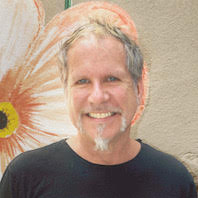Tony Iommi Administers Last Rites to Black Sabbath and Shares His Memories of the Band's Final Gig
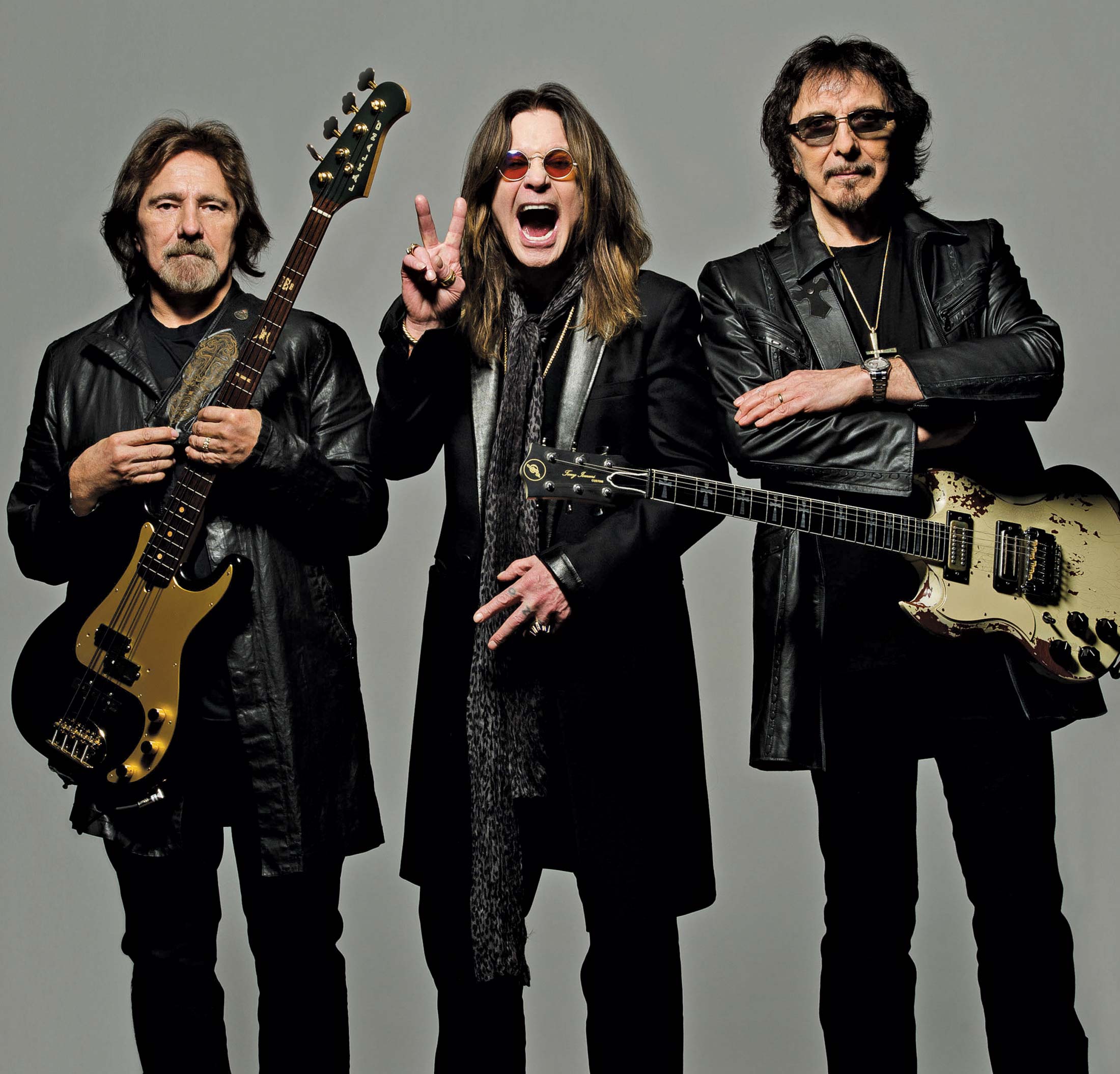
On February 4 , 2017, Black Sabbath guitarist Tony Iommi, singer Ozzy Osbourne and bassist Geezer Butler took the stage for one last sold-out show together in their hometown of Birmingham, England. As they ripped through classic songs like “War Pigs,” “Iron Man” and “Paranoid” in front of 16,000 fist-pumping fans, there wasn’t a dry eye in the house.
It was the end of an era—an extremely heavy one.
“It did get a bit nostalgic,” says Iommi. “I definitely thought of how long the whole thing has gone over the years, and how long we’ve known each other. I felt all that onstage. It was a bit…it felt sad, really. All these people from all over the world came to see us, including many that followed us from the very beginning, and you could see they were upset and crying, so it was an emotional experience.
“There was this one couple who came to see us all the time in South America. We would play one of those shows in front of 80,000, and they would somehow squash through and make it to the front. And, lo and behold, I look down at our last show in Birmingham, and there they are, in the front row.”
For those unable to attend the band’s grand finale, the performance was captured for posterity by Dick Carruthers, the director behind classic concert films like Led Zeppelin: Celebration Day and The Who Live at the Royal Albert Hall. Titled The End of the End, the DVD documents the entire show plus offers behind-the-scenes footage, personal anecdotes and fabulously intimate studio performances of material not featured on the tour.
“I was very satisfied,” says bassist Geezer Butler. “I thought the band played and sounded as good as could be. I was surprised at how little I moved around the stage, but I was probably concentrating too hard on my playing…excuses, excuses,” he adds with a somber chuckle.
It was only right that Sabbath should end their illustrious career in the city where it started. Like Bruce Springsteen and New Jersey, Black Sabbath will always be associated with Birmingham. Known for its dangerously polluted air, alarming homicide rates and some of Britain’s most hideous buildings, the sprawling industrial center was the perfect breeding ground for the band’s bleak and powerful music. It was also fodder for their dark mythology: a wicked modern world inhabited by alienated iron men, evil women and the doomed.
Get The Pick Newsletter
All the latest guitar news, interviews, lessons, reviews, deals and more, direct to your inbox!
On the flip-side, Birmingham also was a wild hotbed of innovation. By the year 2000, of the 4,000 inventions copyrighted in the U.K., 2,800 came from the city, including gadgets like the microwave oven, the vacuum cleaner, the smoke detector and the skateboard.
It was in this Petri dish of concrete, crime and creativity that Black Sabbath gave birth to one of most significant and diabolical genres of music of the 20th century—heavy metal. With their megaton riffs, pounding drums, air-raid siren vocals and apocalyptic lyrics, Osbourne, Iommi, Butler and original drummer Bill Ward inspired countless bands, giving rise to deathcore, doom metal, power pop, thrash, pirate metal, hair metal, stoner rock, sludge, grind and mathcore, all of which would be unthinkable without the Big Black Bang of Sabbath.
Perhaps Judas Priest singer Rob Halford put it best: “To me, Sabbath are in the same league as the Beatles and Mozart. They were on the leading edge of something extraordinary.”
At the center of the Black Sabbath explosion was guitarist Iommi, an underrated genius whose use of overdriven amplifiers, power chords and detuned Gibson SGs defined the band’s revolutionary music. His style was born from a blood sacrifice that cost him the tips of his own fingers. At the age of 17, the middle and ring finger of his fretting hand were sliced off in an industrial accident on his last day of work in a sheet metal factory. He was told he would never play guitar again, but instead of drifting into despair he fought back. He fashioned and fitted homemade thimbles to his injured fingers to extend and protect them, and altered his guitar to accommodate his prosthetics. And from those ashes arose something completely original.
“I grew up in a rough factory town, so I was always fighting about something,” says Iommi. “If somebody threw a punch, you’d have to fight back. I think that mentality of not giving in has stuck with me. I’ve never turned my back on a challenge—I’d rather deal with my problems head on.”
In the following interview, Iommi expands on those challenges and how they led to him becoming one of the most influential musicians of the past five decades. While some may raise their eyebrows at such a statement, the evidence of his ongoing importance is overwhelming. While Eric Clapton, Jimmy Page or Jeff Beck might garner more critical acclaim, it could be argued that many more contemporary guitarists and bands sound like descendants of Sabbath than, say, Derek and the Dominos or even Led Zeppelin. Labels like Metal Blade, Nuclear Blast, Relapse, Spinefarm and Prosthetic are filled with ’em, while hundreds more are forming as we speak.
The new Black Sabbath DVD may be called The End of the End, but the truth is, the legacy of Tony Iommi and his band is far from over. It may be just beginning.
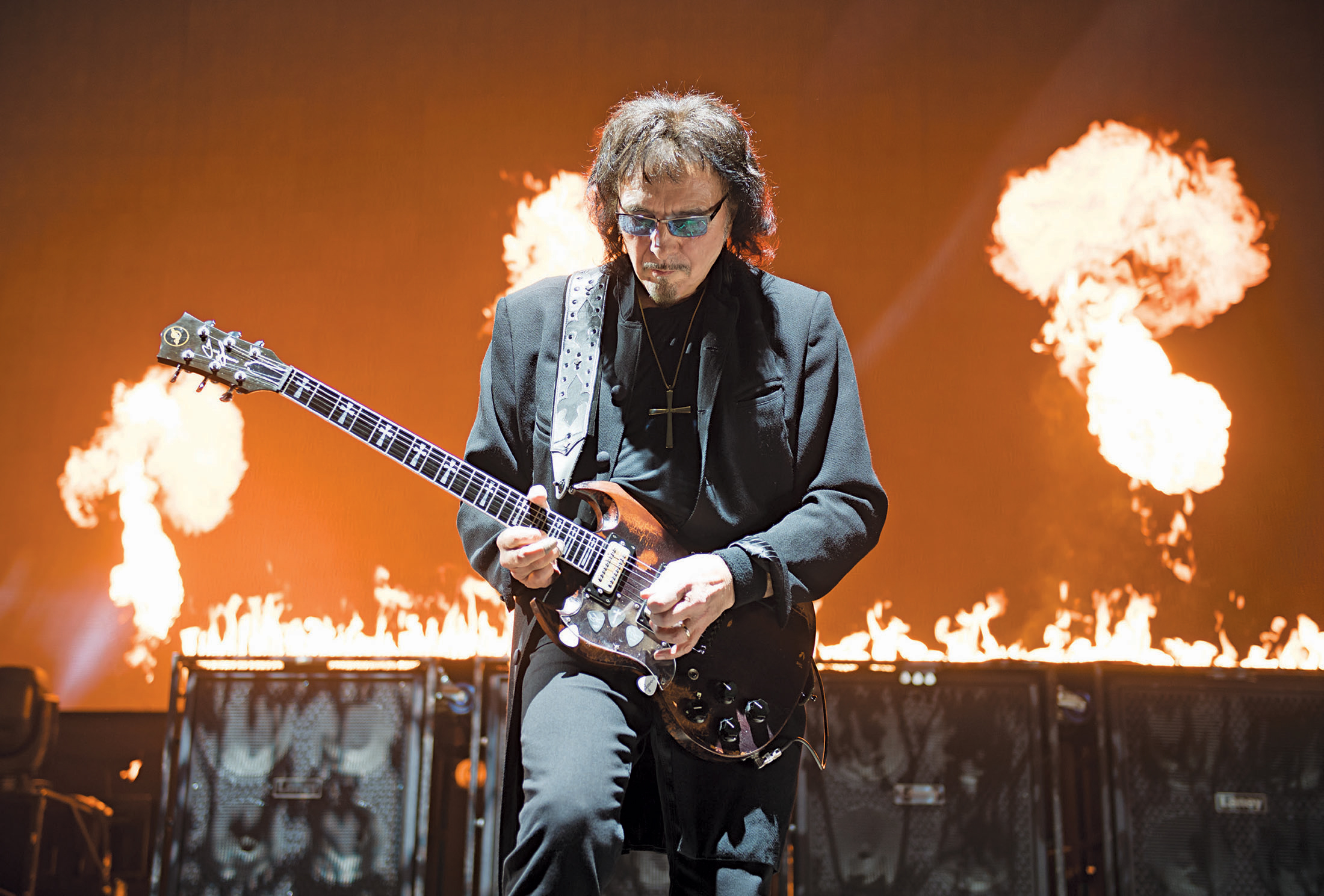
Was there a song on The End of the End that really captured the band’s chemistry?
I don’t know whether I looked at it that way. I just looked at our performance as a whole and I liked the way it went. But as far as one song that captured our sound, I can’t say I looked at it that way.
Did you take any special care to choose the final setlist?
We knew we wanted to play the classics, so we didn’t really play anything off the final album, 13. I would’ve liked to have played some of the songs that we haven’t performed for many years like “Hole in the Sky” or “Symptom of the Universe,” but we could only do songs that Ozzy could still sing. That’s no disrespect to him. When we recorded those songs originally 30 years ago, the keys were so high there was no chance in hell that he could still hit those notes. But it would’ve been nice to have had them in the set.
Did you consider detuning your guitar so it would make it easier for him to hit the notes?
Because I detune already, the strings would’ve been too low, like rubber bands. We detuned with Ronnie James Dio on the last two tours we did with him, but that was just a semi-tone. But let me be clear, nobody was upset with Ozzy. It’s impossible for anyone his age to sing like they did as a kid.
It kinda makes you glad to be a guitar player! Are there any songs you are going to miss playing with Sabbath?
That was certainly going through my mind during the last show. I was thinking, I’ve been playing most of these songs since Day One, and, you know, bloody hell, this will be the last time that I’m going to be playing these songs with these guys! It was strange to look at it like that. It really hit me, especially when I was playing the solo to “Dirty Women,” that I probably wouldn’t have the opportunity to play it that way ever again.
On the other hand, are you happy to never have to play “Paranoid” again?
[Laughs] I’m sure I’ll play it again, somewhere! But you know what? Even though at times, I’ve felt like, Oh, bloody hell, not “Paranoid” again, it’s still amazing how many people know us because of that song. It’s quite bizarre, because we put that song together and recorded it in about 30 minutes, and it became the most famous of them all.
While you didn’t play “Hole in the Sky,” you did play some pretty cool songs that weren’t obvious, like one of my favorites, “After Forever.”
Well, everyone made a list of suggestions and sent it to each other, but it was all down to Ozzy, and what he felt comfortable singing. We tried everything in rehearsal, but it got narrowed down to what he could do on a regular basis. We tried a few different variations in the beginning of the tour, but the following night, Ozzy would say, “Can we not play so-and-so tonight? My throat is sore,” or whatever. And eventually they’d get pulled out, which was a shame.
If it was hard for Ozzy, there was no point in doing it. In a big show like ours, it’s difficult to change songs around because it throws all the lighting people in a panic. They’re all, “Fuckin’ hell, what happened?”
I guess some things never change. Hasn’t it always been, “Ozzy! What’s he doing now?!?”
[Laughs] There is some truth to that.
On the live concert film, you perform a medley of greatest guitar riffs like “Sabbath Bloody Sabbath” and “Supernaut.” Was that an opportunity to sneak in a few songs that Ozzy couldn’t sing, but the fans wanted to hear?
Absolutely. And we wanted to play ’em! So, we figured we do them as an instrumental even if we couldn’t play the whole song. It seemed like a good compromise.
Do you remember the first time you heard the sound of your guitar fill up a gigantic auditorium, and how you felt?
Yes! It was when we first came to the United States and played through a proper P.A. at the Fillmore in New York City in 1970. It was a revelation and we were blown away. It was also the first time we ever played with a stage monitor. We had a P.A. in England, but we didn’t have monitors. I’ll always remember that.
We were so green. We’d carry all our stuff on a plane, with no cases or anything. We’d watch our amplifiers come tumbling down luggage shoots in just a plastic cover, because we didn’t know you had to put them in flight cases. We were never sure if anything would work when we got to the gig.
In a number of interviews, you’ve said that you like to improvise solos because it’s too hard to memorize what you played in the studio. But so many of your solos have become such important parts of the song.
Yes, that’s especially true of the songs from Paranoid. The solos on “Fairies Wear Boots,” “War Pigs” and “Iron Man” have now become part of the song and I’m aware that people want to hear them that way. And, in a way, I did compose them to be memorable. It’s really the later stuff that I did off-the-cuff in the studio.
Why did you change your approach?
As time went on, I liked the idea of capturing a more spontaneous feeling. Typically, I’d try four or five takes. If I did any more than that, I found they’d start going downhill. I’d lose that spark, or I would just repeat myself anyway.
Sabbath almost single-handedly created this new genre of music that, it could be argued, is as important and influential as jazz, blues or hip-hop. Are you surprised at how long heavy metal has stayed relevant? There are more metal bands than ever.
I’m thrilled about it, and how the music has become so big. We originally wanted to sound heavy because we loved the feel and texture of it, and still do. It was from the soul, and it’s really gratifying to have started something new. We weren’t technically brilliant but, like the blues, it gets to you. “Black Sabbath” and “Wicked World” were the roots. When we started playing those songs we knew we were making an original statement, and started building on that.
What astounded us more was that people understood what we were trying to do and supported us. It took us quite a long time to build our fan base, but unlike people these days, we didn’t do it for the money, we wrote this music because we believed in it. It wasn’t commercial at all when we started.
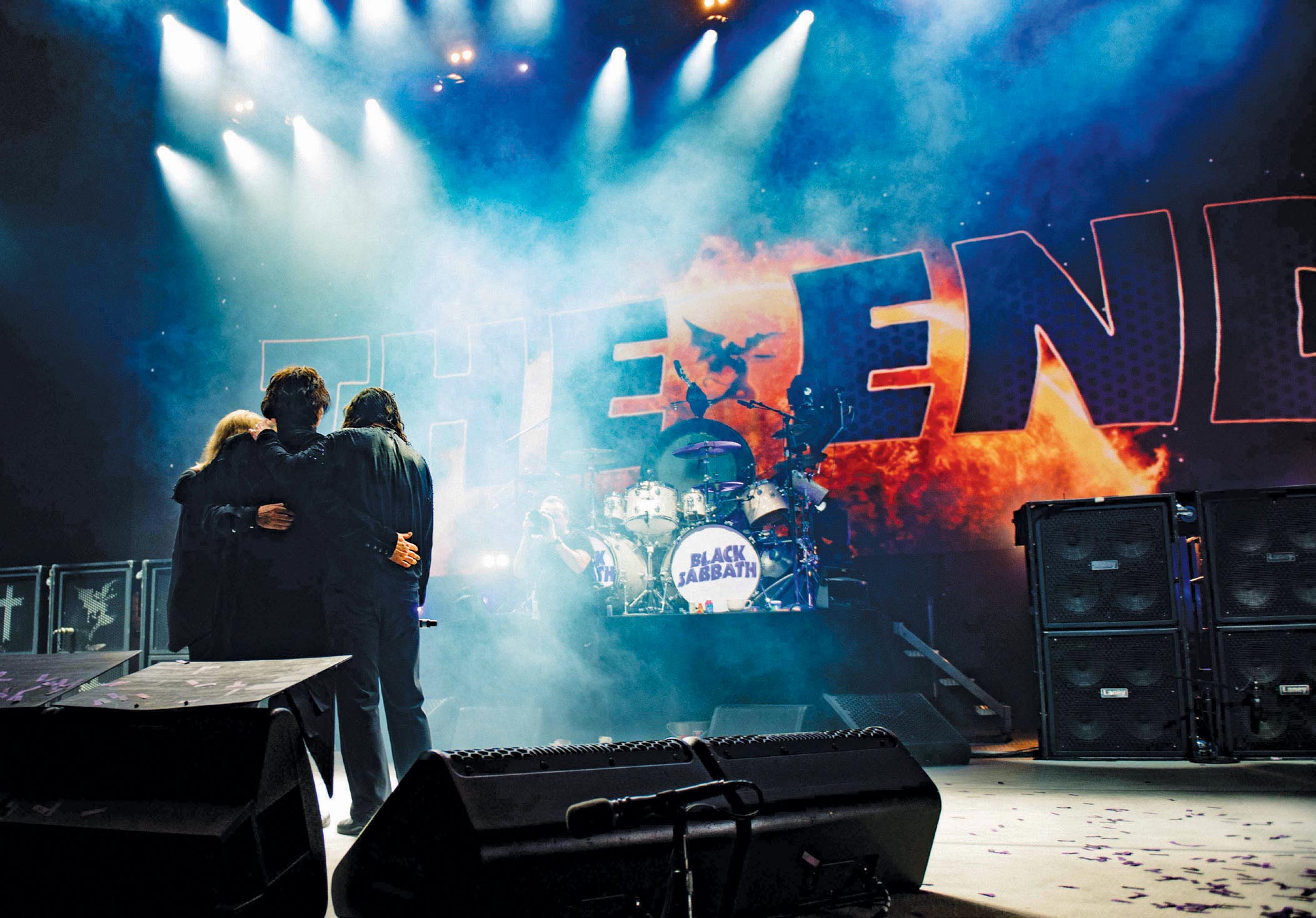
The massive sound of your guitar and the way you used power chords were definitely key to the band’s success, but Geezer’s lyrics were also important. Nobody, except for maybe Bob Dylan, was writing about the world in such a dark and unflinching way. Did growing up in a gritty factory town like Birmingham contribute to that outlook?
I think so. It made a big impression on me and Geezer. Living in Birmingham made us very direct and honest. We didn’t believe in sugarcoating things. I’ve never doubted anything Geezer has played or written. He’s gone unnoticed to a point, and it’s a bloody shame because he’s such a huge part of Sabbath, and has such a huge impact on so many bass players and lyricists. Earlier in our conversation, we were talking about the popularity of “Paranoid.” The lyrics were an important part of that. He was one of the first rock writers to talk about mental illness in such a personal and realistic way. And “War Pigs” is just as relevant today as it was then. Absolutely timeless.
How did losing the tips of your middle and ring finger on your right hand in a factory accident affect how you played and set up your guitar?
It changed everything. Initially, I thought I was finished, but I decided I wasn’t going to accept that. Soon after, I started taking away all the obstacles. There were so many people that told me I would never play again. But I had the courage to question, why?
As you know, I made a couple thimbles to cover my fingers and I started using lighter strings to make it a bit easier to play, but none of it was particularly easy, and it took time and experimentation. For example, I had to figure out how much pressure to apply to the strings, or else they would go out of tune. And I had to find a proper balance between how high the strings could be on the fretboard and how low the frets could be. But I was determined, and I worked at it and did it.
You had a reputation for being pretty good with your fists when you were younger. Did being a scrapper help you overcome the problems with your handicap?
When I was young, I’d get into a fight and my friends would say, “Oh you can’t get him, he’s bigger than you.” It didn’t make any difference to me. It’s what’s in your head and what you know. And those lessons stayed with me with everything I’ve done.
It seems I’ve always had to fight to prove my point of view. I remember I even had to defend the way I wanted to amplify my guitar. There was no such thing as a preamp when we started Sabbath, but I knew I wanted a bigger, more distorted sound. I had this treble booster called a Dallas Rangemaster that was modified by a friend of mine to add even more gain. Other guitarists would say, “You can’t put that in front of the amplifier, you’re gonna overload it.” And I would say, I know—that’s what I want it to do! And that’s the sound you hear on the early Sabbath albums that everyone loves.
All these things, and it went on for years. The only one who understood what I was doing was [Queen guitarist] Brian May. He totally got it and backed me up on loads of occasions.
What happened to the original Rangemaster?
I used it until 1979, when this guy that I hired to modify some Marshalls threw it away! I couldn’t believe it. He thought it was garbage. Truth is, I’ve never been able to replicate that exact sound since.
Did you start detuning your guitar to make it easier to play?
Yes, but that came a little later. The first two albums were played at standard pitch. I didn’t really start experimenting with detuning my guitar until the third album, Master of Reality.
It became a signature, and detuning has become almost mandatory in modern heavy metal. Did you immediately appreciate the effect it had on your sound?
Yes, I think it made a huge difference and added a whole different dimension to Black Sabbath. It made my guitar sound bigger, which was always a motivation. I mean, not counting vocals, what did I really have to work with? We didn’t have keyboards or a rhythm guitar. It was just me, bass and drums. So, we were always working on making our sound larger than life and more powerful. Detuning was part of that, as was Geezer adding distortion or bending notes, which was rare for a bass guitarist in those days.
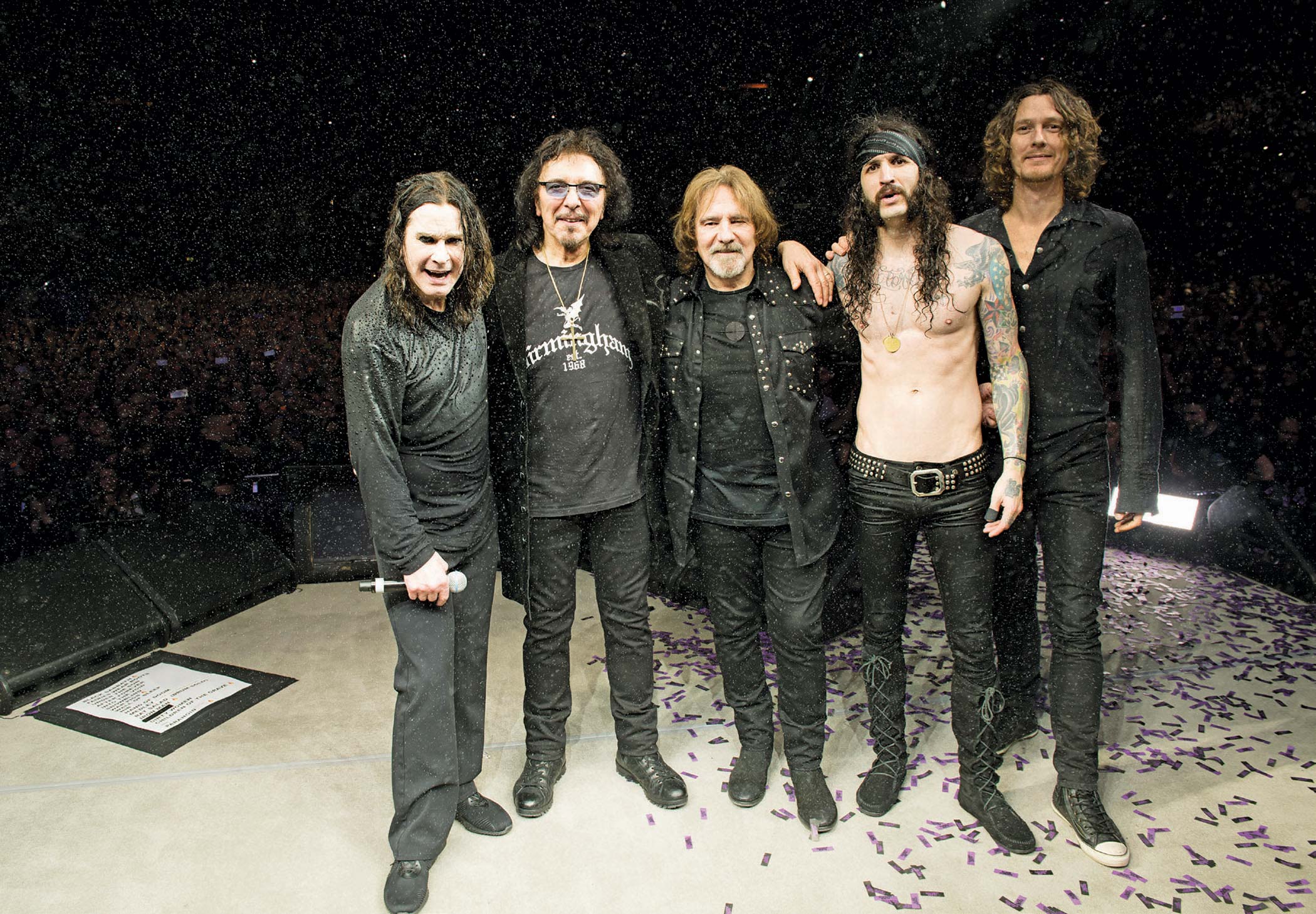
Did you ever consider getting a rhythm guitarist in the band?
I worked with a rhythm player in one of my early bands with Bill Ward. It sounded good, but I also felt it confused things. No guitarist plays the same way, and those differences can clash. When I worked with other guitarists in those days, I always felt certain things sounded odd or didn’t mesh, so I decided on keeping Sabbath a four-piece.
Over the years, however, I’ve played with other players, and had great experiences. When I jam with Brian May, for example, it works. We’re on the same wavelength and we sort of understand and respect each other.
I’d like to hear an album of that!
We’ve talked about it. Who knows?
How would you assess Geezer Butler as a bassist. You guys have played together for so long, you might as well be one person.
Nobody plays like him. He’s so tuned in that he knows where I’m going to go before I do! Yet he’s so laid back, and almost shy in some ways. Very underrated.
On The End of the End, there are moments that your interaction with Geezer reminded me of Eric Clapton and Jack Bruce when they were in Cream. Was that an early influence?
Absolutely. But I think Clapton’s work with John Mayall had a bigger influence. That’s where we wanted to be. We wanted our music to have that sort of freedom. We didn’t want to be regimented, and we never were.
The legendary Muddy Waters once said his blues might sound simple, but they’re the hardest to play because of the nuances and subtleties. Is there something interesting about your playing that people wouldn’t necessarily notice?
Hmm…I’ve never actually given that any thought. Here’s something. After the accident, I had difficulty bending strings, but I wanted to be able to play those blues notes. So instead of bending strings I started playing these little hammer-on trills. It became an identifiable part of my style, but that’s how it started. I still use them quite a bit.
I also think my use of open strings to make my riffs sound bigger is a subtlety that might go unnoticed.
You may not remember this, but in 1992 I interviewed you for Guitar World and I brought along a little six-inch amp so we could do a few lessons for the magazine. What blew my mind was that you essentially sounded the same coming out of this dinky amp. Your sound was still surprisingly big.
Ha! I do remember that little amp.
My question is, you’ve played through a lot of guitars and amps over the years. Do they really make any difference?
Being left-handed, I don’t often use different guitars, but yeah, I can usually dial in a sound on most amps and still sound like me.
So, with all the innovation in amplification, would you say your sound has improved?
Well, it’s funny, but I’ve gone in one big circle. My primary amp in the early days of Sabbath was a Laney Supergroup, because they were a Birmingham-based company and they offered us gear when nobody else did! Eventually, I tried a bunch of different things. I had some Mesa/Boogies and tried various Marshalls, but I was never completely satisfied. So, on the last tour, I started looking for vintage Laney amps like my early ones, and couldn’t find any. I decided to reach out to Laney and ask them to build me 10 amps like my Supergroup. Unfortunately, no one knew how to build them, because most of the people that worked at the factory weren’t even born in 1968! But there was one bloke from the early days who took on the project along with Lyndon Laney, who helped build my amps in the Nineties, and they did an amazing job.
They built me these 10 amps that were basically the same as my original amps, but sturdier and better quality. So fuckin’ hell, I came straight back to where I started, and it just sounds good!
I’m gonna ask you the stupidest question a guitar magazine can ask…
…like what are my 10 favorite Sabbath songs?
No, no.
Thank God, I hate that question! So, what is it?
What kind of pick do you use?
That’s not stupid at all. That’s a sensible question because they do make a tremendous difference. I use Dunlop mediums, and sometimes light picks. I feel clumsy with a heavy pick and I don’t like the way they sound. I’m sorry, I keep coming back to Brian May, but he used to use that six pence coin. I tried playing with once and I kept dropping it. I couldn’t hold onto the bloody thing. I don’t know how he did it.
You and Geezer never moved around too much onstage, but there was a certain power in your stillness. When I was a kid, I’d think, Whoa! Those guys are serious. Was that conscious?
I never had the desire to jump all over the place. If I did, I’d probably make mistakes right and left. In a way, you’re right. I’ve always been serious about my playing, but I was also concerned about my thimbles. I’d be in trouble if they came off! Additionally, I had to be more precise than players with regular fingers, because I can’t feel the strings, so God knows what sound would come out if I was doing windmills or running around.
You’ve had some pretty wild stage outfits though…blue silk devil capes and such.
[Laughs] It was the Seventies, what can I say? We had a girl that made our idiotic stage clothes. Fringes all over…blue, white and purple! I wouldn’t be seen dead in any of that now. When you’re in the middle of certain era, you don’t really think about it. But now, I see pictures and say, “Oh fucking hell, why did I wear that?” But once you’ve done it, it’s embedded in photos and you can’t remove it, and it’s a bit embarrassing. But, yeah, I did have some strange outfits. But it was what it was.
Do you still have any of it?
I don’t think so. I think one of my ex-wives said, “What’s all this junk?” and threw most of it out. I’d go on tour and come back, and it would be gone. Some of those things might turn up somewhere, but I think it’s better off gone!
In The End of the End, there is some fascinating footage of the band playing a bunch of classic songs in the studio, including “The Wizard,” “Wicked World” and “Sweet Leaf.” What was the purpose?
We were trying to give fans a last chance to hear us play some of our favorite songs for that last time. We couldn’t fit them all in a single show, so we decided to go back and do a few in the studio.
It’s pretty cool, because there is such clarity to the sound. You can really hear how great the band is.
I’m glad you like it, but we played in less than ideal circumstances. I was told not to turn up too loud, because they were afraid that I would deafen the cameramen. The room was also pretty echo-y.
“The Wizard,” more than any song, shows your transition from originally being a blues band to being Black Sabbath. It has both elements. What was your relationship to the blues?
We like the blues in the early days because the songs were straightforward and used roughly the same chords, so you could put together a set pretty quickly! But no one would notice that the songs were similar if you changed the tempos. And I liked the blues because every song had a solo, so it gave me a lot of opportunity to play and try out ideas. “Wicked World” was fun, because it allowed us to play around with more jazzy rhythms and ideas.
What would you like people to know about Ozzy and Geezer that the myths and legends don’t appropriately convey?
Geezer is a bit of a recluse, although he’s opened up over the years. He’s very deep, reads a lot and is very funny. He has a very dry wit.
And what can you say about Ozzy? He’s Ozzy. He’s never been any different. He’s got a heart of gold and will do anything for you. He’s always been level with me. And talk about family—we’ve always been brothers.
Unfortunately, on last tours we hardly saw each other. We’d see each other onstage or when we’d travel, but on days off you wouldn’t see anybody! Our lives changed when they stopped drinking. I didn’t stop, but my illness slowed me down a bit. When we were drinking, we used to go down and talk and be together all the time. But as soon as they stopped, we just fell off, you know?
We always got on great. But we lost contact and didn’t have those personal conversations. Each of us would have our own entourage. So, after we’d get off the plane, each of us would have our own cars and go to our own rooms. Which is a shame because when we did have a chance to sit and talk like we did in the studio, we’d have a laugh and it was like old times. I missed that comradeship.
How is your health? You were diagnosed with lymphoma a few years back.
Healthwise, I seem to be alright for the moment. It’s still in remission. I continue to have my regular checkup every six weeks, and it’s a bit easier for me now that I’m not touring. The doctors were concerned about all the flying I was doing, because it isn’t good for the blood. But I’m on top of it, and I’m eating the right things…although sometimes I still eat the wrong things. [laughs]
Future plans?
I’m not sure. I’m still involved with Sabbath to some degree, because we’ve been very involved with the film and how it sounds. I’m still going to write, and I’m quite excited about the future because it’s a mystery.
I like the idea of an album with Brian May!
We talked about it when he came over the house a couple months ago. I’d like to do only things that I really enjoy now, and that would be one of them.
What’s your guitar of choice these days?
I’ve got my signature Gibson guitars, and my signature Epiphone, which is really good. And I still use “Old Boy,” which is my custom guitar built back in the Seventies by JayDee Custom Guitars, but here’s a funny story for you. Several years ago, I got a call from Gibson, and they told me that they’d like to build a guitar for me for my 60th birthday. I told them that I’d like a good jazz guitar, and they said no problem. I was sort of excited about it, but then my birthday came and went, and there was no guitar.
I figured it would come eventually, but then I turned 61, 62, 63…and still no guitar. Eventually, I forgot about it. Then, out of the blue, on my 65th birthday, the guitar finally shows up.
Was it good?
Excellent!
A long time ago in a galaxy far, far away Brad was the editor of Guitar World from 1990 to 2015. Since his departure he has authored Eruption: Conversations with Eddie Van Halen, Light & Shade: Conversations with Jimmy Page and Play it Loud: An Epic History of the Style, Sound & Revolution of the Electric Guitar, which was the inspiration for the Play It Loud exhibition at the Metropolitan Museum of Art in New York City in 2019.
“The main acoustic is a $100 Fender – the strings were super-old and dusty. We hate new strings!” Meet Great Grandpa, the unpredictable indie rockers making epic anthems with cheap acoustics – and recording guitars like a Queens of the Stone Age drummer
“You can almost hear the music in your head when looking at these photos”: How legendary photographer Jim Marshall captured the essence of the Grateful Dead and documented the rise of the ultimate jam band
